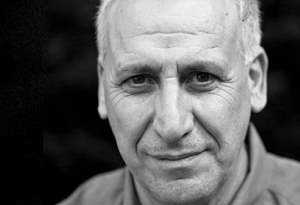Follow Your Passion! How to Live Your Life's Purpose

Photo: Julie Dermansky
Finding that irresistible thing in your life that you can't live without can be a struggle, but once you discover it, don't let go! Poet Edward Hirsch shares how he uncovered his passion for poetry and why he was determined to make it his life's purpose.
I started writing poetry as a teenager in suburban Chicago out of emotional desperation. I was overwhelmed by feelings I couldn't understand, emotions that were so powerful and intense, so unusual to me, that I thought I would drown. I wanted to express what I was feeling, to make sense of it, to give it order and shape, to transform it. I needed help to keep my head above water. I hit upon writing lyric poems, which are short and intense; lyrics put tremendous pressure on the sounds of words, and they break up sentences into lines, which are rhythmic experiences. Poems mesmerized me, and I felt better when I was writing them, or trying to, more in touch with something deep and dark within myself.I grew up in a middle-class house without books, without art. No one around me wrote poetry or even read it. Even my teachers seemed indifferent to it. The sole literary presence from my childhood was my grandfather, a Jewish immigrant from Latvia, who eccentrically copied poems into the backs of his books. After he died, when I was 8 years old, my grandmother gave his books away, and his poems were lost. My family had always noted the strong physical resemblance between us, but after I began writing poems in high school, those lost poems also became part of my legacy, an incitement from the past. Even though I was on my own, I felt less lonely because I was carrying on something that my grandfather had almost willed to me. I wanted to live up to that inadvertent gift, to use it to make contact with others. I decided to become a poet.
How Edward began to pursue this passion

Photo: Courtesy of Knopf
The oldest word for poetry in ancient Greek is poesis, which means "making." A poet is a maker, and a poem is a made thing. Poetry is not simply a medium for raw self-expression, but an art, and I set out to learn everything I could about that art, to become worthy of its long history, worthy of the great dead who practiced it over the centuries, to school my passions. The desire to find other solitaries, writers who were struggling to give voice to their joys and torments through language, led me in college to the great poets of the past. I read them with a wild excitement and longing, and I took them as inspiration for my own poems. As I expanded my reading and developed my craft, I felt that I was participating in a long and noble enterprise. The poets who have meant so much to me became a kind of second family, and they offered me worlds and languages, devastations and delights, models and pathways beyond my upbringing.
Those poets always companioned me, especially when I faced fierce opposition, sometimes from the people closest to me. My parents wanted their oldest son to become a doctor or a lawyer; being a poet was not on their radar. But I felt strongly that poetry was my life's purpose, and I was absolutely determined to live out that purpose. I am 60 years old now, and I have just published my new and selected poems, which brings together 35 years of work. I feel as powerfully as I ever did the true nobility of poetry, the urgency of trying to get something right in language, what it means to be a maker. I have tried to leave behind a record of my intensities, my exultations and despairs, my immersion in the living fire.
Read a poem from Edward's book The Living Fire
Edward Hirsch is a poet, teacher, literary critic and tireless advocate for poetry. He has received numerous awards and fellowships, including a MacArthur Fellowship, a Guggenheim Fellowship and an Ingram Merrill Foundation Award. In 2008, he was elected a chancellor of the Academy of American Poets. In March 2010, Knopf released The Living Fire: New and Selected Poems, which brings together 35 years of Hirsch's poems. He is now the president of the John Simon Guggenheim Memorial Foundation and lives in New York City.
Discover the Poet in You
Those poets always companioned me, especially when I faced fierce opposition, sometimes from the people closest to me. My parents wanted their oldest son to become a doctor or a lawyer; being a poet was not on their radar. But I felt strongly that poetry was my life's purpose, and I was absolutely determined to live out that purpose. I am 60 years old now, and I have just published my new and selected poems, which brings together 35 years of work. I feel as powerfully as I ever did the true nobility of poetry, the urgency of trying to get something right in language, what it means to be a maker. I have tried to leave behind a record of my intensities, my exultations and despairs, my immersion in the living fire.
Read a poem from Edward's book The Living Fire
Edward Hirsch is a poet, teacher, literary critic and tireless advocate for poetry. He has received numerous awards and fellowships, including a MacArthur Fellowship, a Guggenheim Fellowship and an Ingram Merrill Foundation Award. In 2008, he was elected a chancellor of the Academy of American Poets. In March 2010, Knopf released The Living Fire: New and Selected Poems, which brings together 35 years of Hirsch's poems. He is now the president of the John Simon Guggenheim Memorial Foundation and lives in New York City.
Discover the Poet in You



